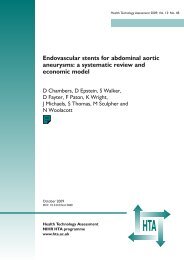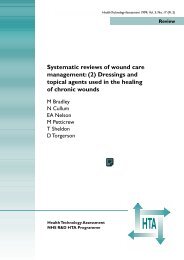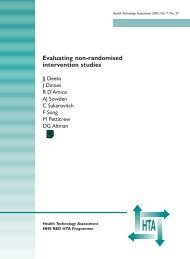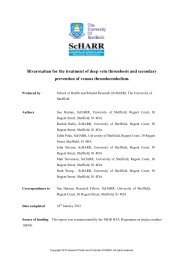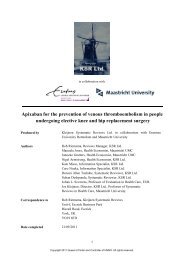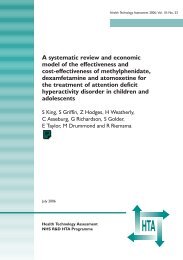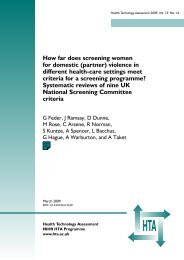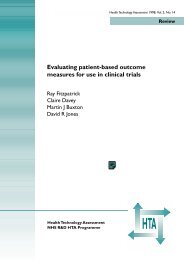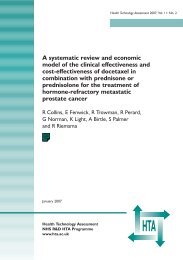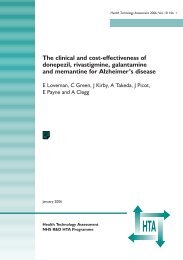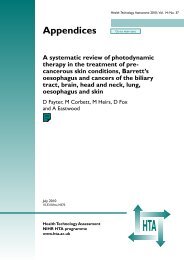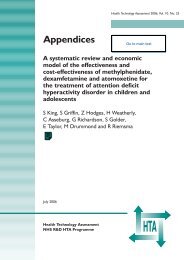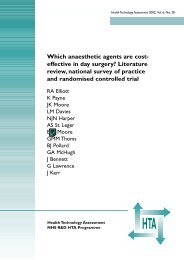Effectiveness of Laxatives in the Elderly - NIHR Health Technology ...
Effectiveness of Laxatives in the Elderly - NIHR Health Technology ...
Effectiveness of Laxatives in the Elderly - NIHR Health Technology ...
You also want an ePaper? Increase the reach of your titles
YUMPU automatically turns print PDFs into web optimized ePapers that Google loves.
8<br />
Treatment <strong>of</strong> constipation<br />
<strong>of</strong> <strong>the</strong> sample to take laxatives. Heaton and<br />
Cripps (1993), <strong>in</strong> <strong>the</strong>ir UK survey <strong>of</strong> 1892 adults,<br />
found that 3% <strong>of</strong> men and 5% <strong>of</strong> women aged<br />
60–69 years reported use <strong>of</strong> laxatives once a<br />
week or more, and that 3% <strong>of</strong> those report<strong>in</strong>g<br />
laxative use denied ever be<strong>in</strong>g constipated.<br />
<strong>Laxatives</strong> appear to be <strong>in</strong> very common use <strong>in</strong><br />
<strong>the</strong> hospitalised elderly <strong>in</strong> Brita<strong>in</strong>. Wood and<br />
colleagues (1995) have <strong>in</strong>vestigated <strong>the</strong> use <strong>of</strong><br />
oral and rectal laxatives <strong>in</strong> 232 patients at three<br />
hospital sites <strong>in</strong> Leeds. Prescription charts were<br />
reviewed on a s<strong>in</strong>gle day for all elderly patients<br />
to identify <strong>the</strong> number and type <strong>of</strong> preparations<br />
used. A total <strong>of</strong> 46% <strong>of</strong> patients were found to<br />
be tak<strong>in</strong>g oral laxatives. The majority were tak<strong>in</strong>g<br />
lactulose ei<strong>the</strong>r s<strong>in</strong>gly or <strong>in</strong> comb<strong>in</strong>ation and<br />
a m<strong>in</strong>ority (8%) were tak<strong>in</strong>g <strong>the</strong> bulk laxative,<br />
Fybogel ® . There was no policy for assessment<br />
<strong>of</strong> constipation or choice <strong>of</strong> treatment, which<br />
resulted <strong>in</strong> a wide range <strong>of</strong> treatment practices<br />
across <strong>the</strong> hospital wards surveyed. In a subsequent<br />
2-week prospective survey, only one case<br />
was found where <strong>the</strong> prescriber attempted to<br />
diagnose <strong>the</strong> cause <strong>of</strong> constipation and choose<br />
an appropriate laxative on that basis. On ano<strong>the</strong>r<br />
ward, <strong>the</strong> need for laxatives was assessed by staff<br />
perform<strong>in</strong>g digital rectal exam<strong>in</strong>ations every<br />
third day. The authors conclude <strong>the</strong>ir report<br />
by rais<strong>in</strong>g <strong>the</strong> question <strong>of</strong> whe<strong>the</strong>r health<br />
pr<strong>of</strong>essionals are <strong>the</strong>mselves guilty <strong>of</strong><br />
laxative abuse.<br />
Attitudes to defecation<br />
Some <strong>of</strong> <strong>the</strong> lack <strong>of</strong> association between frequency<br />
<strong>of</strong> constipation and laxative use may be partly<br />
expla<strong>in</strong>ed by <strong>the</strong> fact that <strong>the</strong> sufferer def<strong>in</strong>es<br />
constipation differently from <strong>the</strong> cl<strong>in</strong>ician. While<br />
cl<strong>in</strong>icians emphasise frequency, <strong>the</strong> elderly tend<br />
to def<strong>in</strong>e constipation <strong>in</strong> terms <strong>of</strong> symptoms,<br />
<strong>in</strong> particular, stra<strong>in</strong><strong>in</strong>g (Whitehead et al, 1989).<br />
Moore-Gillon (1984) attempted to f<strong>in</strong>d out what<br />
patients actually mean by <strong>the</strong> term ‘constipated’<br />
by survey<strong>in</strong>g 287 hospital attenders. Less than<br />
half <strong>of</strong> this group def<strong>in</strong>ed it <strong>in</strong> terms <strong>of</strong> frequency,<br />
as opposed to stra<strong>in</strong><strong>in</strong>g or pa<strong>in</strong>. Probert and<br />
colleagues (1995) also emphasised <strong>the</strong> lack <strong>of</strong><br />
overlap between slow gut transit time (> 92 hours),<br />
<strong>the</strong> Rome criteria for constipation (based on<br />
stra<strong>in</strong><strong>in</strong>g, <strong>in</strong>complete evacuation, consistency<br />
and frequency) and self-perceived constipation<br />
(‘do you consider yourself to be constipated?’).<br />
There are <strong>the</strong>refore two dynamics <strong>in</strong>fluenc<strong>in</strong>g<br />
<strong>the</strong> greater use <strong>of</strong> laxatives <strong>in</strong> <strong>the</strong> elderly. First,<br />
based on evidence, older people are actually at<br />
greater risk <strong>of</strong> constipation as a consequence <strong>of</strong><br />
age<strong>in</strong>g. Second, <strong>the</strong> greater use <strong>of</strong> laxatives may<br />
partly reflect a cohort effect, s<strong>in</strong>ce beliefs <strong>in</strong><br />
bowel regularity and <strong>the</strong> necessity <strong>of</strong> purg<strong>in</strong>g <strong>the</strong><br />
body <strong>of</strong> dangerous wastes were common earlier<br />
this century. These beliefs probably represent <strong>the</strong><br />
l<strong>in</strong>ger<strong>in</strong>g effects <strong>of</strong> popular Victorian <strong>the</strong>ories <strong>of</strong><br />
‘<strong>in</strong>test<strong>in</strong>al auto<strong>in</strong>toxication’ (Chen & Chen, 1989).<br />
Auto<strong>in</strong>toxication is still an important sell<strong>in</strong>g po<strong>in</strong>t<br />
for some non-prescription treatments for<br />
constipation available today (Table 2).<br />
TABLE 2 Excerpts from advertis<strong>in</strong>g material for<br />
non-prescription laxatives<br />
“Aloegold ® forms a l<strong>in</strong><strong>in</strong>g <strong>in</strong> <strong>the</strong> colon that keeps <strong>the</strong><br />
toxic waste from re-enter<strong>in</strong>g <strong>the</strong> body”<br />
“Intest<strong>in</strong>al and colon hygiene is very important to<br />
our overall health. By limit<strong>in</strong>g saturated fats and o<strong>the</strong>r<br />
more difficult to digest foods...you have a much better<br />
chance <strong>of</strong> avoid<strong>in</strong>g <strong>the</strong> build up <strong>of</strong> tox<strong>in</strong>s <strong>in</strong> <strong>the</strong> lower<br />
digestive tract”<br />
“When <strong>the</strong> colon is elim<strong>in</strong>at<strong>in</strong>g regularly, less bacteria<br />
forms, and <strong>the</strong>refore less bacteria is absorbed <strong>in</strong>to<br />
<strong>the</strong> system, or stays <strong>in</strong> <strong>the</strong> colon where any number<br />
<strong>of</strong> discomforts can occur” (advertisement for<br />
gum karaya)<br />
The regular use <strong>of</strong> laxatives may, <strong>the</strong>refore,<br />
be partly due to <strong>the</strong> belief <strong>in</strong> <strong>the</strong> necessity <strong>of</strong><br />
frequent regular defecation. In support <strong>of</strong> this,<br />
a UK postal survey <strong>of</strong> beliefs about bowel function<br />
<strong>in</strong> 171 patients aged 55 years and over found that<br />
79% <strong>of</strong> respondents believed that a daily bowel<br />
movement was important, and 90% believed<br />
that regularity was necessary for good health<br />
(MacDonald & Freel<strong>in</strong>g, 1986).<br />
Serious side-effects <strong>of</strong><br />
laxative use<br />
It has been suggested that many laxatives<br />
came <strong>in</strong>to use before rigorous drug studies were<br />
required; hence, <strong>the</strong>re is little <strong>in</strong>formation on <strong>the</strong><br />
side-effects <strong>of</strong> such preparations (Kamm, 1989).<br />
Excessive use <strong>of</strong> laxatives may exacerbate <strong>the</strong><br />
problem <strong>of</strong> constipation by caus<strong>in</strong>g colonic<br />
damage (Read et al, 1995). Chronic use <strong>of</strong> laxatives<br />
has been claimed to lead to <strong>in</strong>tractable<br />
constipation or ‘cathartic colon’, caused by loss<br />
<strong>of</strong> colonic motility, although <strong>the</strong>re is no evidence<br />
from prospective studies to support this (Gattuso



